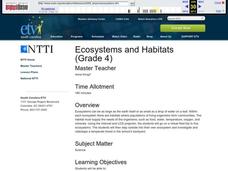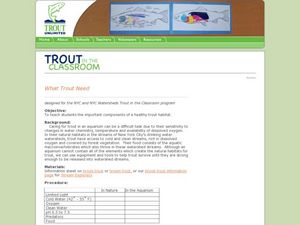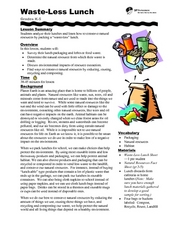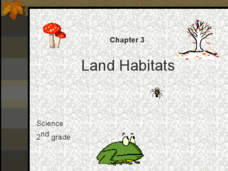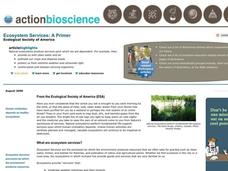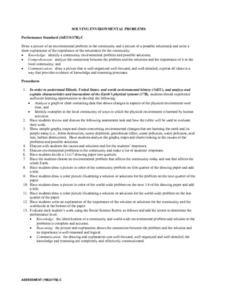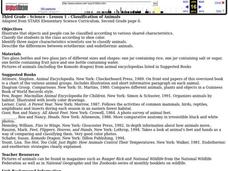Curated OER
Ecosystems and Habitats
Fourth graders go on a virtual field trip to five ecosystems. They investigate and videotape a temperate forest in the school's backyard.
Curated OER
Ecological Impact of Wood Extraction
Young scholars explore their local environment by conducting a class experiment. In this deforestation lesson, students discuss the effects of wood harvesting on forests around the world and research environment related vocabulary terms....
Curated OER
Rainforest Vocabulary Words: Week 1
In these rainforest vocabulary worksheets, read the definitions and the matching terms for the following rainforest vocabulary terms: decomposers, deforestation, epiphytes, extinct, environment, pollute, vegetation, ecology, climate,...
Curated OER
Ecosystem Damage from Household Cleaners
Third graders assess the damage done to various ecosystems by cleaning products and discover how scientists test water quality. Using stream water and common household cleaning agents, they work in groups to test for pH levels. Once...
Curated OER
Identifying Wetlands
High schoolers describe three major categories of indicators that are used to delineate wetlands. In this wetlands lesson plan students visit a wetland and make observations then complete an activity using the soil.
Curated OER
Birds of Wisconsin
First graders explore the job done by ornithologists. They role play identifying the characteristics that make a bird a bird. They discuss what makes each bird species unique. Students are introduced to Wisconsin's most common and rare...
Curated OER
What Trout Need
Students investigate the important components for a healthy trout habitat. In this fish habitat lesson, students discuss how the aquarium will simulate a trout's environment in nature. Students complete a trout information sheet to set...
Curated OER
The Chesapeake Bay in Captain John Smith's Time
When Captain John Smith visited the Chesapeake Bay in the summer of 1608, what types of animals and habitats did he encounter? Your young historians will analyze primary source documents to answer this question, as well as compare the...
Curated OER
Environmental Exchange Box
Students examine the characteristics of their own environment and compare them to another region. They prepare a box filled with items and stories about their own region, exchange the box with another class in another region, and...
Curated OER
Rainforest Complexity and Diversity
Second graders investigate the diversity of plants and animals in a rainforest. They watch an online story developed by the Rainforest Alliance, observe and record animals in their local area, explore various websites, and compare and...
SF Environment
Waste-Less Lunch
Is it possible to have a waste-less lunch? Can your class become leaders in conservation? Discuss the importance of reducing waste during lunch time with a fun lesson that can be extended to everyday practices. First the class examines...
Curated OER
Land Habitats: Grade 3 Science
Build your students scientific vocabulary with this slide show on land habitats. Each slide provides a vocabulary word, image, and definition of a term common to habitats and the environment. Great for science class or as comprehensible...
Curated OER
Wolves
Students explore wolves. In this ecology and wolves lesson plan, students research predator-prey relationships on the Internet and complete a related worksheet with a partner. Students interpret data on bar graphs to determine growth and...
Curated OER
How Much Is an Ecosystem Worth?
Learners examine the value of ecosystems. They read and analyze an article, evaluate ecosystem services, research the benefits of biomonitors, and design a public service announcement.
Curated OER
Global Resources: What Will You Do with Your Power?
Students examine the human impact on natural resources. They read and discuss an article, evaluate nations regarding their environmental problem-solving, develop a presidential speech on the environment, and conduct a natural resources...
Curated OER
Past Time: Vocabulary Practice
In this past time worksheet, students select the word or phrase from 3 choices that means the same as the word in bold in 12 sentences. All pertain to events in the past.
Curated OER
Vocabulary Practice With Past Time
In this word meanings worksheet, students practice their vocabulary skills while using the past tense. Students complete twelve multiple choice questions where they choose the correct meaning of the bold word in each sentence.
Curated OER
Our Changing Environment-- A Demonstration
Students observe and describe changes in an environment when some of the components are changed. They recognize the process of succession by
preparing a miniaturized environment in which a variety of plants and seeds are grown.
Curated OER
Solving Environmental Problems
Students identify a community environmental problem and possible solutions. They analyze the connection between the problem and the solutions and the importance of it to the local community. Students then draw a picture of an...
Curated OER
Classification of Animals
Third graders practice classiyfying items and identify three major characteristics scientists use to classify animals. They describe the differences between ectothermic and endothermic animals.
Curated OER
Making a Taxonomic Key
Students work as a team of abalone taxonomists who examine and classify abalones based on their shell characteristics of the four most common species. They also study the visible details of each species shell, make notes and eventually...
Curated OER
Madagascar Adventure
Middle schoolers develop photo essays on Madagascar's environmental challenges. In groups, students research and develop photo essay slide shows to explore the issues of balancing the needs of Madagascar's human population with those of...
Curated OER
Cypress/Tupelo Swamps
Students study the geologic history of terrain, soils, and drainage patterns. They recognize ecological processes that determine the dynamic nature of habitats. They investigate the influence of human activity on the landscape.
Curated OER
What If We Run Out?
Students explore the consequences of shrinking habitats and the human impact on wildlife populations. They participate in a game to study the consequences and describe the preservation of animal habitats.


